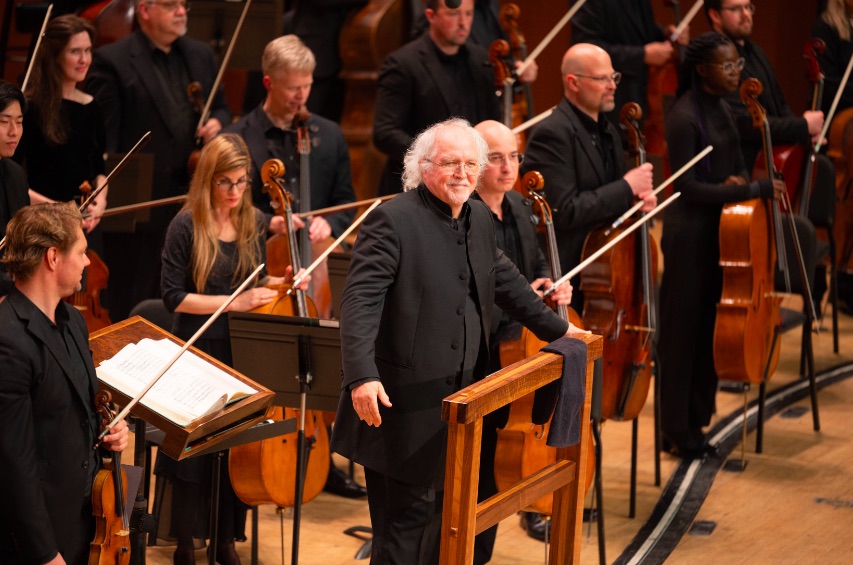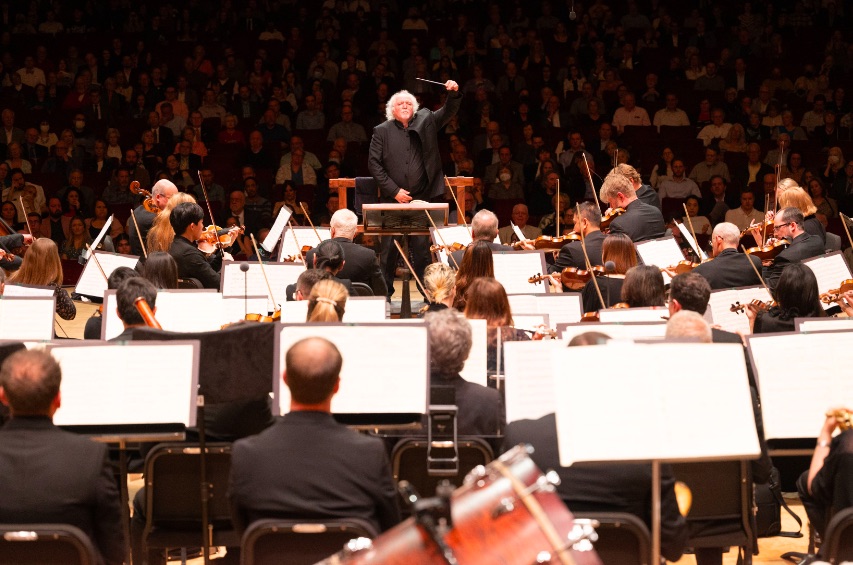It’s a beautiful thing to see an orchestra, and an audience, in tears. Saturday in Symphony Hall, Sir Donald Runnicles led his final performance as the Atlanta Symphony Orchestra’s principal guest conductor, a position he took some 23 years ago.
Amid thunderous cheers for their Mahler Fifth Symphony, and appreciating this emotional farewell, Runnicles shook hands and hugged the inner-circle string principals around the podium. He pointed and waved thanks to key players stationed further back. Then he waded deep into the ensemble and gave a bear hug to veteran clarinetist Ted Gurch. All at once you could see the players across the stage crying; Gurch seemed to break down, burying his flushed face in his hands.
The audience continued its double-fortissimo roar and, even after several curtain calls, wouldn’t let him go. Finally, he pulled the first-desk violinists, David Coucheron and Justin Bruns, to depart the stage with him and, with that, the Runnicles era ended. Somehow, even with the audience filing out of the hall, the music of Mahler continued to hang in the air and ring throughout the room. In the best performances, a Runnicles concert could do that.
Across his two-decade run, the ASO has been through a couple of music directors, multiple changes in administration, and countless guest conductors, from the stick-waving novice to the expert maestro. Runnicles himself has held several posts: at the San Francisco Opera, the Deutsche Oper Berlin, the BBC Scottish Symphony and more. Throughout, although he typically conducted just a handful of programs in Atlanta each season, they were often the highlights. These were the shows that, years later, people still remember and still talk about.

It helps that Runnicles typically conducted weighty and deep repertoire, from Olivier Messiaen to James MacMillan and from Beethoven’s Missa Solemnis to Humperdinck’s Hansel & Gretel. A couple of decades ago, to pluck out one strong memory, I recall him conducting a thrilling Richard Strauss’ Alpine Symphony — a crazy, overwrought behemoth that’s too expensive to program and usually too difficult to pull off. Runnicles had the ASO playing beyond its peak. Regular listeners felt the orchestra had made an artistic leap in the most demanding repertoire. And it was Runnicles who took the ASO Chorus with him — just the chorus — when he made his Berlin Philharmonic debut in Benjamin Britten’s War Requiem.
Some years ago, during an ASO’s budget crisis, the Runnicles’ position was on the chopping block. But Sue Williams and her late husband, Neil, felt he was too special an artist to lose. So they endowed his role, and the principal guest conductor afterwards held the Neil and Sue Williams Chair. Increasingly, he’s become an important figure everywhere. In 2020, the Scottish-born Runnicles was knighted by then-Prince Charles for his service to British music.
All that appreciation for Sir Donald fed into Saturday’s concert.
Their program of Three Excerpts from Alban Berg’s dystopian opera Wozzeck and Gustav Mahler’s Symphony No. 5 held the promise of Runnicles and the ASO at their finest partnership. (Side note: The Midtown Atlanta mass shooting last week forced the ASO to shelter in place and thus cancel an essential rehearsal. As a result, the ASO switched Thursday evening’s ticketed event to its “dress rehearsal.” Saturday night became the one and only “performance,” suitable for review.)

In remarks to the audience Saturday, Runnicles explained the horror and dark emotional beauty of Wozzeck, where an impoverished soldier — obviously shell-shocked from the Great War — sells his body for medical experiments to help provide for his prostitute girlfriend, Marie, and their child. Runnicles walked us through these three short, painful scenes in Wozzeck, culminating in the father murdering the mother and the child being laughed at by the other children because he didn’t know his mother was dead. In the music, it’s painful, but the mother’s love for her child — all she can offer, at least — somehow shines through.
Premiered in 1925, Berg’s music just tips over the edge of tonality, where the tunes are unsettlingly chromatic and harmonically blurry. Even the lightest, bounciest moments are tremendously dense and fraught. The fully atonal bits are suitably disorienting for the psychodrama. Our antihero, and his world, have gone mad. You hear it detailed in the music.
Runnicles had worked with American mezzo-soprano Irene Roberts in Berlin, and made an inspired decision to cast her as Marie. (Another point of appreciation: over the years, Runnicles mentored singers to reach their peak roles, one performance at a time. He helped train the great soprano Christine Brewer, for example, as she prepared to sing her first Brünnhilde at the Met. For Atlanta, that meant we heard top-tier singers traverse epic repertoire.)
With a huge voice, Robert’s mezzo was husky and dark and textured, loaded with nuance and pathos. Singing a swaying lullaby in German, she made clear her maternal love in a shattered world: “You are only a whore’s child and yet you give your mother so much joy with your dishonest face.” Later, she sculpted phrases as an actress, admitting to herself her bleak future: “Not a soul would come to my help.”

The end is devastating. The music simultaneously falls (as if drowning) and rises (up to Heaven) with darkness closing in as the scene becomes blindingly luminous. Roberts sang “Hop Hop” as the child plays on his hobby horse, still innocent. The orchestra wavers for a bit, as if in shock, then suddenly stops cold. The silence that followed was a brutal, hold-your-breath moment, and I don’t think anyone in the Symphony Hall audience was left unmoved.
As the conductor mentioned at the top, Berg was immersed in Mahler’s music and developed a Mahler-sized vocabulary, and then takes it one step further.
After intermission, for the Mahler Five, the anticipation was palpable, and the ASO did not disappoint. Michael Tiscione played the opening trumpet call with defiant brilliance and an undercurrent of dread, just right. Throughout, Runnicles brought out the inner voices, making the interpretation comprehensive on so many levels it was sometimes hard to know where to pay attention. There was a slight loss of focus in parts of the inner movements, but it was quickly restored.
He took the famous Adagietto at a loving tempo (nine minutes and 28 seconds to be exact; the timing of this section matters), with harpist Elisabeth Remy Johnson’s thick low notes looming overhead like an angel of death. And they muscled through the finale with the orchestra on adrenaline overload.
The ASO is a quality major orchestra with room for artistic growth, and thus will forever attract ambitious talent on the podium. Undoubtedly, there will be great guest conductors in our future. But Runnicles created his own two-decade golden age of Atlanta Symphony history, one that won’t soon be forgotten.
::
Pierre Ruhe was the founding executive director and editor of ArtsATL. He’s been a critic and cultural reporter for the Washington Post, London’s Financial Times and The Atlanta Journal-Constitution, and was director of artistic planning for the Alabama Symphony Orchestra. He is publications director of Early Music America.

